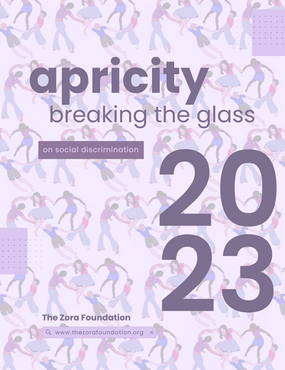
APRICITY: BREAKING THE GLASS
OVERVIEW
APRICITY: the warmth of the sun in winter
— Definition from Merriam-Webster Dictionary
Discrimination is the prejudicial treatment of individuals and communities based on characteristics such as race, gender, disability and/or sexual orientation. Systems of oppression deeply impact marginalized communities. The exponential increase in hate crimes in recent years attests to the effects and consequences of people’s detrimental beliefs, hastening the need to combat our country’s inherent bigotry.
Whether it is our country’s systemic processes or our culture, discrimination is still deeply embedded in our everyday lives. At Zora, we believe that social justice advocacy through creative mediums helps fight prejudice by highlighting different perspectives and experiences through artistic means.
Metaphorically, apricity represents our new generation of changemakers. Through our work this year, we hope to not only inform our communities about a range of social discriminatory issues but also help construct a more holistic and positive narrative around the importance of community awareness as well as the humanity of those combating discriminatory challenges. As we work to lift up community narratives, we intend to break archetypes perpetuated by society and apricate in the light of the hope for social equity.
The Zora Foundation officially published our Spring 2023 Apricity: Breaking the Glass literary art magazine focused on addressing social discriminatory issues in April 2023.
The magazine features art and literary works by students from the Cambridge School of Weston, Governor's Academy, Phillips Academy Andover, Walnut Hill School for the Arts, Weston High School, Boston Public Schools and more!
To view our magazine on Canva, please click on this link here.
Intro to Social Discrimination
Individuals and communities may be discriminated against because of their race/ethnicity, sex/gender, sexual orientation, age, disability, religion, nationality and origin, language, culture, political beliefs and on many other grounds. Discrimination can also occur in many different ways: direct, indirect, harassment and victimization.
A selection of social discrimination categories are described further below.
Racial and Ethnic Discrimination
Racism is a constructed ideology that determines an individual's inherent traits and abilities based on their racial and ethnic membership. Racism affects every country in the world as it systemically denies people their full human right to equity and opportunity because of the color of their skin, descent and/or national origin.
The Covid-19 pandemic brought racial discrimination in the United States to the spotlight as the murder of George Floyd and the surge in Anti-AAPI violence instigated subsequent Black Lives Matter protests and the international Stop Asian Hate movement. It is of uttermost importance to keep racial justice at the forefront of social justice advocacy given that racism unchecked can fuel unimaginable atrocities such as the 1994 Rwanda genocide.
.
.
Gender Discrimination
Gender discrimination is the disparity in treatment of people of different gender identities. Gender discrimination may be carried out by an individual, by an organization, and is sometimes embedded in laws. Some examples of gender discrimination include the pay gap between workers of different genders, sexual harassment or preferential treatment based on gender identity, and others.
Disability Discrimination
Disability discrimination is the unfair treatment of someone based on their disability or disabilities. This prejudice does not have to be illegal or intentional for it to be considered discrimination. There are many kinds of disability discrimination including direct discrimination (when someone is treated less well compared to others because of their disability/disabilities), indirect discrimination (policies directed at everyone negatively impact someone with disabilities), victimization (someone has observed disability discrimination and is forced to keep quiet), and others.
LGBTQ+ Discrimination
The LGBTQ community faces not only the discrimination, harassment, and violence of others but also the many legal barriers to being able to live freely. There currently exists many obstacles for the LGBTQ community in areas including but not limited to: parenting (ex. the ability to adopt); legalization of marriages; the lack of nondiscrimination protections and general rights (ex. discrimination in employment, housing, and public places including restrooms).
Religious Discrimination
Religious discrimination occurs when an individual is treated unfairly based on their (or their partner’s/family’s) religious beliefs or affiliations. Religious discrimination can range from offensive comments about someone’s religious practices or ideas to physical harassment centered on someone’s religion. There is direct discrimination, where someone is treated poorly based on their religion, and indirect discrimination, where systems or policies that apply to everyone put someone of a certain religious background at a disadvantage.



















































































































